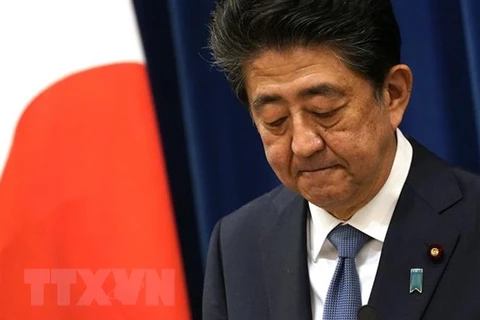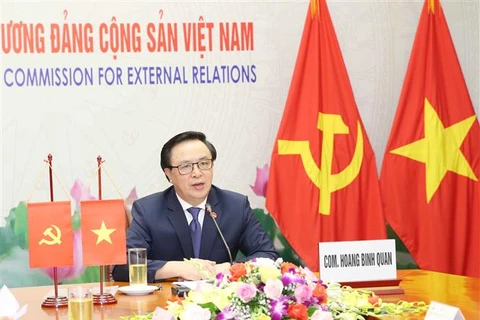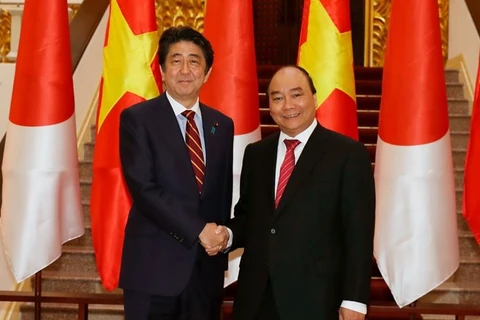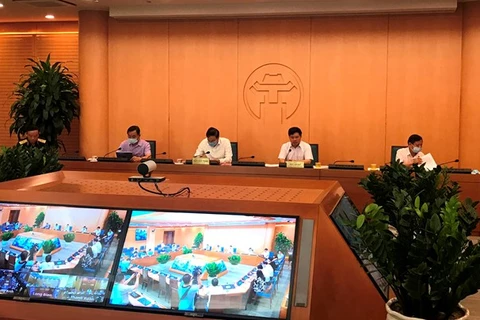 Acting Minister of Health Nguyen Thanh Long (L) and Japanese Ambassador to Vietnam Yamada Takio sign the exchange of notes (Photo: VietnamPlus)
Acting Minister of Health Nguyen Thanh Long (L) and Japanese Ambassador to Vietnam Yamada Takio sign the exchange of notes (Photo: VietnamPlus) Hanoi (VNA) – The Vietnamese and Japanese Governments on September 7 signed the exchange of notes on a non-refundable aid for COVID-19 prevention and control in Vietnam.
On the behalf of the two governments, Acting Minister of Health Nguyen Thanh Long and Japanese Ambassador to Vietnam Yamada Takio signed the exchange of notes.
The ODA grant is worth 2 billion JPY (18.8 million USD) in total, including 1.8 billion JPY to the Vietnamese side and about 200 million JPY to the agents designated by the Japanese Government. It will be disbursed in 18 months, from August 2020 to January 2022.
The assistance aims to provide technical support in upgrading medical equipment at four hospitals of the Vietnamese Health Ministry, namely the National Hospital for Tropical Diseases, the National Lung Hospital, the Da Nang C Hospital, and the National Institute of Hematology and Blood Transfusion, thereby helping to improve their capacity in COVID-19 prevention and control.
Appreciating the grant, Acting Health Minister Long expressed his hope that the equipment will be provided for the hospitals soon, asking them to use the new facilities as efficiently as possible so as to continually improve the quality of health examination and treatment.
For his part, Ambassador Yamada Takio said the Japanese Government highly values the Health Ministry of Vietnam’s role in successfully containing the novel coronavirus in the country although this pandemic is still ravaging around the globe.
He also noted when Japan faced a face mask shortage in Spring, the Vietnamese Government supported it with over 1.2 million masks, adding that the Japanese people appreciated the gift.
The grant for the four central hospitals of Vietnam is an initiative of the Japanese Foreign Minister that is meant to supply medical equipment for other countries, including Vietnam, in the fastest manner to promote their healthcare capacity, the diplomat added.
After the signing ceremony, Acting Health Minister Nguyen Thanh Long and Ambassador Yamada Takio discussed several issues related to the resumption of commercial flights between the two countries.
Over the past years, health cooperation between Vietnam and Japan has been continuously expanded. Japan is currently one of the biggest ODA providers for the Vietnamese health sector.
Through the Japan International Cooperation Agency (JICA), the Japanese Government has assisted Vietnam with many non-refundable aid, technical assistance projects and preferential loans.
These cooperation projects have been implemented effectively, bringing about substantial contributions to people’s health care, including increasing the capacity of preventive medicine and disease prevention and control, improving hospital infrastructure, and bettering diagnosis, treatment and care for patients.
According to Chief Representative of JICA in Vietnam Shimizu Akira, in recent years, Japan’s ODA share over the total ODA to Vietnam exceeds 30 percent and Vietnam has been one of the biggest recipient countries of Japan’s ODA in comparison to the rest of the whole world. In five years between 2014 and 2018, the total amount of loan, technical cooperation and grant aid has accumulated up to 5,324 billion JPY, 40 billion JPY and 73 hundred million JPY, respectively.
In terms of healthcare and social security, for a long time, the agency has been closely collaborating with top institutes and hospitals such as National Institute of Hygiene and Epidemiology (NIHE), Bach Mai, Cho Ray and Hue Central hospital, which the result contributed much in controlling COVID-19 pandemic. Moreover, projects such as Vaccine production facilities of POLYVAC or insurance provider payment methods and basic health service have helped Vietnam to address the pending issues in health care and social security./.























